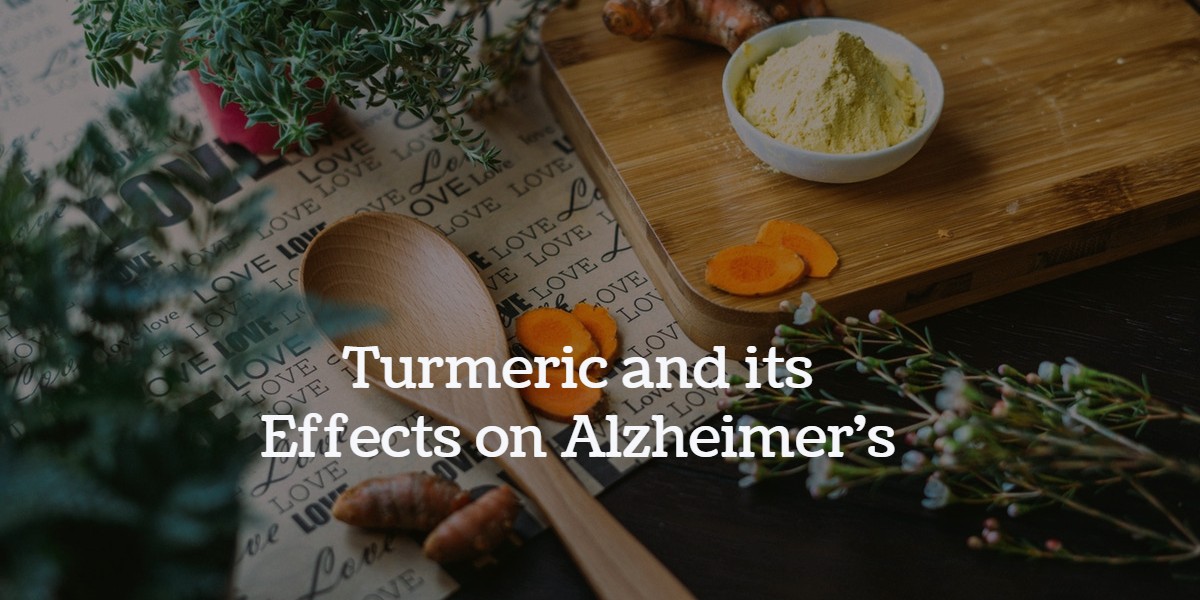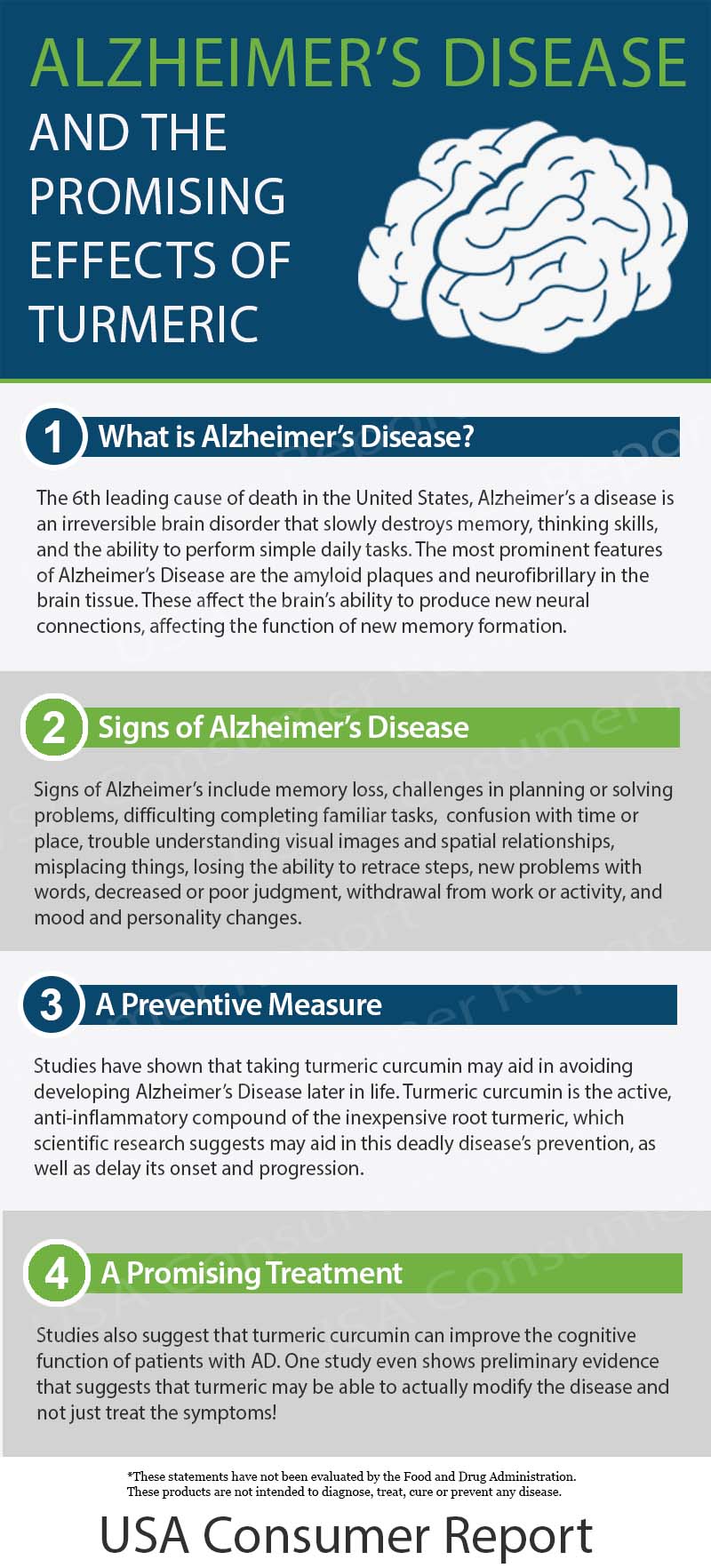
The 6th leading cause of death in the United States is Alzheimer’s disease. Alzheimer’s a disease is an irreversible brain disorder that slowly destroys memory, thinking skills and the ability to perform simple daily tasks.
Learning a family member has been diagnosed with Alzheimer’s could be some of the worst news you could hear in your lifetime. It kills more than breast cancer and prostate cancer combined. It’s not all bad news though—scientific research suggests that a natural inexpensive compound could aide in prevention of this deadly disease.
What is Alzheimer’s Disease?
The name Alzheimer’s comes from the name of Dr. Alois Alzheimer, who discovered the disease in 1906. Dr. Alzheimer noticed abnormal brain tissue clumps in a woman who had died from an unknown mental illness. When he examined her brain, he discovered amyloid plaques and neurofibrillary in the brain tissue. She had symptoms that included memory loss, unpredictable behavior and language problems. The plaques and tangles in the brain are some of the most prominent features of Alzheimer’s.
There are many different changes that occur in the brain from Alzheimer’s. One of them is a lack of connections between neurons. Neurons transmit messages throughout the body to organs and the muscles from the brain. “This damage initially appears to take place in the hippocampus, the part of the brain essential in forming memories. As neurons die, additional parts of the brain are affected. By the final stage of Alzheimer’s, damage is widespread, and brain tissue has shrunk significantly.” [1]
10 Warning Signs of Alzheimer’s According to Alzheimer’s association
- Memory loss
- Challenges in planning or solving problems
- Difficulty completing familiar tasks at home or work
- Confusion with time or place
- Trouble understanding visual images and spatial relationships
- Misplacing things and losing the ability to retrace steps
- New problems with words in speaking or writing
- Decreased or poor judgement
- Withdrawal from work or activities
- Mood and personality changes
Source: https://www.alz.org/alzheimers_disease_10_signs_of_alzheimers.asp
What is Turmeric?
Turmeric curcumin, is the key ingredient used in Indian curries. Turmeric comes from the Curcoma Longa plant which is native to India, Indonesia and other Southeastern Asian countries.
This herb is closely related to the other members in the ginger family. The herb itself is derived from the rhizome of the plant, which is dried before the useful powdered form can be acquired. In order for turmeric to thrive, it needs to be grown in a specific environment and be maintained at a certain temperature, so most turmeric is exported from where it originates in Southeast Asia. If you have ever tried curry you have definitely consumed turmeric.
Turmeric is also known for its bright golden yellow color, and has a strong scent of hot, peppery mustard. Turmeric is often a complementing addition to many dishes, and aside from that the scientific and medical communities have discovered multiple potential health benefits of this herb.
Turmeric’s Effect on Alzheimer’s
Researchers have found that turmeric has been effective in both the prevention and treatment of Alzheimer’s disease. Studies have shown that curcumin, an anti-inflammatory and antioxidant substance found within turmeric “improves the cognitive functions in patients with AD”.[2]
Scientists believe that based on available evidence from studies conducted on turmeric that “curcumin will lead to a promising treatment for Alzheimer’s disease.”[3]
While the health benefits of curcumin are promising up until this point, many questions remain and large-scale human testing still needs to be carried out to fully understand its effects.
In a study conducted on three Alzheimer’s patients with severe symptoms, researchers observed remarkably improved behavioral symptoms as a result of turmeric treatment. These patients had no adverse reactions as a result of turmeric consumption. Specifically, turmeric was effective in the treatment of hallucinations, delusions, anxiety, depression, irritability, agitation and apathy in Alzheimer’s patients.[4]
A study done on curcumin loaded-PLGA nanoparticles showed that capsules containing extracts from turmeric “are able to destroy amyloid aggregates, exhibit anti-oxidative property and are non-cytotoxic.”[5] Amyloid aggregates are part and parcel of several degenerative diseases that affect the function of the brain.[6] The study also noted that in addition to turmeric being a promising candidate drug for the treatment of Alzheimer’s disease, its low cost would allow for it to be more widely accessible than other options.
Currently, the only treatments for Alzheimer’s promote cholinergic transmission, or in other words, they only treat the symptoms of Alzheimer’s and not the underlying disease. This is what makes turmeric so promising in the development of treatment for Alzheimer’s; that there is preliminary evidence of turmeric being able to actually modify the disease and not just treat the symptoms.
In a study done at the University of Western Sydney, researchers found that the compounds found within turmeric might actually “delay the onset of Alzheimer’s disease or slow down its progression”.[7] They concluded that the curcumin within turmeric is an exceptional candidate for anti-inflammatory therapy for not just those suffering from Alzheimer’s but also related degenerative disorders. Based on their findings, they urged that clinical trials into the matter be carried out.

Share this Image On Your Site
Safety of Turmeric and its Compounds
The researchers from the study done at the University of Western Sydney mentioned above observed no adverse side effects from conducting their study. They concluded that turmeric has an “excellent safety profile” and based on doses of up to 12 grams per day, they observed no toxicity in human or animal subjects.[8]
In two separate studies performed on rats and monkeys, researchers found that turmeric “produced no detrimental physiological or toxicological effects.”[9]
There has been extensive research into turmeric, the vast majority of which concluded that turmeric is safe for human consumption.[10]
While taking turmeric is likely very safe, it’s important to not take more than the recommended dose listed on the package of turmeric products.
Possible Side Effects of Turmeric
Very few side effects of turmeric have been observed, and the reported ones are not serious/life-threatening. Turmeric side effects may include upset stomach, skin rash, could lead to iron deficiency and can decrease blood sugar in those with diabetes. As such, those with a propensity for iron deficiency or diabetes should use turmeric cautiously and consult with a physician before use.[11][12][13]
Looking for a turmeric supplement? Check out our guide to the best turmeric supplements here.
Sources
Click to See Sources- https://www.nia.nih.gov/health/what-alzheimers-disease
- https://www.ncbi.nlm.nih.gov/pmc/articles/PMC2781139/
- https://www.ncbi.nlm.nih.gov/pmc/articles/PMC2781139/
- https://www.ncbi.nlm.nih.gov/pmc/articles/PMC3665200/
- http://journals.plos.org/plosone/article?id=10.1371/journal.pone.0032616
- https://www.ncbi.nlm.nih.gov/pmc/articles/PMC3709793/
- https://www.ncbi.nlm.nih.gov/pmc/articles/PMC4590215/
- https://www.ncbi.nlm.nih.gov/pmc/articles/PMC4590215/
- http://ir.cftri.com/2003/
- https://iubmb.onlinelibrary.wiley.com/doi/full/10.1002/biof.1079
- https://www.drugs.com/npc/turmeric.html
- https://www.webmd.com/vitamins/ai/ingredientmono-662/turmeric
- https://www.livestrong.com/article/454309-tumeric-ginger-and-cancer/
Disclaimer: The statements herein have not been evaluated by the FDA. The information here is for educational purposes only and is in no way intended to diagnose, cure, or treat any medical or other health condition. The content on USA Consumer Report does not constitute medical advice and is not intended to be and should not be used in place of the advice of your physician.